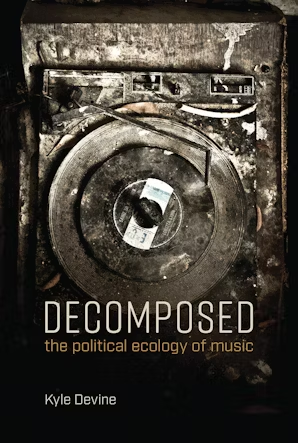
Decomposed (2019) Kyle Devine
Devine’s argument is direct and straightforward. It is historical and alarming. His intent is an explicit demystification of the consumption of recorded music (“Music is not special. It is ordinary”, p. 181). In short, the very dematerialed experience of the listener belies the ongoing (even increasing) material catastrophies wrought by the production of recorded music. That impact is often out of sight, on the other side of the world (Devine details attempts to uncover working conditions in Thailand, Democratic Republic of Congo and China). While the focus on the materiality of cultural consumption comes at the expense of a wider engagement with the cultural politics of cultural consumption this is a necessary and welcome intervention. Devine details the following genealogy of the conditions of the material production and the accompanying political ecology of recorded music:
Before 1950, 78 rpm records were made of shellac, a bug-based resin. The material was harvested and processed largely by women and children in India. Between 1950 and 2000, formats such as LPs and CDs were all made of petroleum-based plastic. PVC manufacturing 1 2 3 Follow APA citation style. Include 5 to 10. Approximately 300 words for papers and book chapters; approximately. 600 words for full-length books.in the 1970s led to illegal pollution including “exposing workers to toxic fumes, releasing toxic chemicals into the air and dumping toxic wastewater down the drain”. (p. 111) In fact, at its peak “The “production impact” of this activity was such that […] carbon dioxide […] released into the atmosphere [was]—more than the total emissions of some small countries.” (p. 114) Today, recordings exist as data-based audio files. Streaming music relies on infrastructures of data storage, processing, and transmission that have potentially higher greenhouse gas emissions than the petrochemical plastics used in the production of more obviously physical formats such as LPs. To stream music is to burn coal, uranium and gas. In fact, in the streaming age, emissions continue to rise. “[…] digitalization neither extinguishes the emissions profile nor sublimates the scrap signature of the recording industry. It changes them in complex ways.” (p. 154)
In short the consumption of recorded music is essentially an extractive industry and care and attention needs to urgently be drawn to its consequences. For the streaming listener, shorn of the Vinyl, liberated from the plastic case, there is an illusory sense (“mystification” in Devine’s terms) of listening without consequence. Yet, the ethical and political implications of cultural consumption, in addition to the ecological impact, need to be central concerns of any account of an AOC across digital media in the 21st century. What does it mean to stream music, film, to meet online etc.? Contra Devine, music (and cultural products more generally) is more than capitalist consumption. In some ways, it is exceptional, it can be extraordinary. The changing form of the medium brings with it a changing politics and ethics for good and ill. For example, in the streaming age, children no longer grow up repeatedly listening to some random album that happens to be in the family collection. Instead, there are endless possibilities for truly global listening as the “World Citizen” section of Spotify Wrapped reveals, this feature reveals how global the user’s tastes are by counting the different countries that the user listened to music from on the platform.
These, no doubt, are small rewards, experienced by the privileged listeners, for the ecological devastation wrought by the production of the music commodity. That listeners are complicit is not a lesson plan. Rather the value of this text is epistemological, the hidden impact of increasing dematerialised cultural consumption is the basis of an AOC. This book is but the start of greater attention to the political ecology of music and film. In texts such as Audible Infrastructures: Music, Sound, Media, 2021, Devine, Boudreault-Fournier have considered musical instruments, music festivals, paper scores, radios, stereos, speakers, touring etc. While Vaughan in Hollywood’s dirtiest secret: the hidden environmental costs of the movies, 2019, considers the environmental impact of the film industry
Connell Vaughan
TU Dublin
Devine, Kyle, Decomposed, MIT Press, 2019
